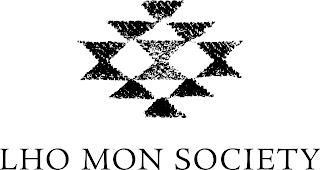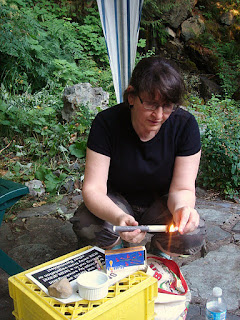Building a solid team of advisors and partners is the key to the success of Lho Mon Education and it's also the activity that makes this job most fulfilling. There are so many great people out there. If it wasn't for Katherine Riley volunteering her time during her sabbatical from teaching high school in Vermont, we wouldn't have the LME Framework document that is the basis for all the curriculum development we are now doing. She was so easy to work with, bright, experienced, supportive, creative, and ready to collaborate. And funny! I miss our daily work sessions.
It is encouraging to see the caliber of people that this project is attracting. Lately I have been seeking the advice and guidance of Professor Alex Lautensach, assistant professor in the School of Education at the University of Northern British Columbia (UNBC), Canada. He is providing invaluable feedback related to our teacher training program. It means the world to me whenever someone really takes the time to read through all of the documents that Katherine and I originally developed. Professor Lautensach's research expertise is broad: environmental ethics and human behaviour, determinants of human security in the areas of health and environmental support structures, science education and affective learning outcomes, teaching and learning for sustainability, and bioethics education and cultural safety. It's the perfect fit.
And now that Lho Mon Education is forming an alliance with the Bhutan Nuns Foundation, I have the honor and privilege to work with their founder and executive director Dr. Tashi Zangmo. To have a Bhutanese counterpart with such devotion to her work and with such an open mind is really a blessing. I've really enjoyed our brainstorming sessions and also finding out that we both attended schools in the Pioneer Valley of Massachusetts. She's such an asset to the country and we are really lucky to be working with her. The hope is that we will train one teacher who will be dedicated to teaching the nuns and together we will create a curriculum specifically for them but based on the LME Framework. The curriculum will be implemented in at least one nunnery as a pilot, in tandem with the CGI pilot. She is also developing a resource center for nuns in Thimphu where we could conduct classes. Our first course of action is coming up with ways to teach teachers how to teach Life Skills and we are open to suggestion.
Lhomon Education (LME) is a grassroots initiative fostering the development of innovative curricula designed specifically for Bhutanese students. The basis of the LME initiative is an alternative model of teacher training and curriculum development that integrates principles of Gross National Happiness (GNH) in the truest sense of the term.
Monday, November 21, 2011
Some of you may notice one major change here: We are no longer SJI Education. Rinpoche has long said that "education is the key" to his vision of creating an enlightened society in east Bhutan. With that in mind and considering the broadening scope of the curriculum development we have been working on, he suggesting moving the education component out from under SJI to its own independent project that will stand side by side SJI under the Lho Mon Society umbrella. Lho Mon Society is the civil society organization, Bhutan's version of an NGO, that looks after both of these initiatives. I am pleased therefore to introduce the all new Lho Mon Education and am excited about the change. I'll soon post the URL of our new web site and other information as we grow into our own.
English Starts Now
It was wonderful to finally meet the monks in Dewathang who will be participating in the pilot project. And especially wonderful to have our founder Dzongsar Khyentse Rinpoche there with us. We held several key meetings with the top khenpos who run the monastery to hammer out the details of our project and select the class who will be our inaugural group. We chose the young ones, the most recent additions to the monastery, most of whom just completed the second grade. I sat behind them during the 10 day puja and was impressed by their diligence, camaraderie, good humor, and good behavior (even when naughtily tickling the ear of a dozing monk).
 Rinpoche spent hours of is precious time discussing his vision of what we can do and how. He was full of enthusiasm and amazing ideas. I am very grateful and encouraged and inspired at the moment.
Rinpoche spent hours of is precious time discussing his vision of what we can do and how. He was full of enthusiasm and amazing ideas. I am very grateful and encouraged and inspired at the moment.
One thing became very clear: CGI is ready for the English program to begin immediately. The monks are very eager for it and since we are teaching the LME curriculum in English, it's key that they have a head start. So in just a few days I managed to find a willing and very capable volunteer to come to Dewathang for six months of intensive English Language instruction beginning in January 2012. That's soon! Our volunteer, Debbie Miller has spent many years teaching English in Korea but many of you have met when she was volunteering at SSRC near Whistler. There is much to prepare in advance of her arrival and I will soon be announcing an online campaign where people can help support this important first step of the initiative.
 Rinpoche spent hours of is precious time discussing his vision of what we can do and how. He was full of enthusiasm and amazing ideas. I am very grateful and encouraged and inspired at the moment.
Rinpoche spent hours of is precious time discussing his vision of what we can do and how. He was full of enthusiasm and amazing ideas. I am very grateful and encouraged and inspired at the moment. One thing became very clear: CGI is ready for the English program to begin immediately. The monks are very eager for it and since we are teaching the LME curriculum in English, it's key that they have a head start. So in just a few days I managed to find a willing and very capable volunteer to come to Dewathang for six months of intensive English Language instruction beginning in January 2012. That's soon! Our volunteer, Debbie Miller has spent many years teaching English in Korea but many of you have met when she was volunteering at SSRC near Whistler. There is much to prepare in advance of her arrival and I will soon be announcing an online campaign where people can help support this important first step of the initiative.
Wednesday, November 2, 2011
Teaching Zero Waste

For the past four days, I've been here in east Bhutan at the Chokyi Gyatso Insitute, site of SJI Education's first pilot project. I've been meeting with the head khenpos and lopons, making acquaintance with the monks, enjoying the warmer weather, and sitting in the ceremony that started yesterday. The puja lasts all week and Dzongsar Khyentse Rinpoche is here presiding. He's been discussing SJI and GNH at every mealtime and telling us stories of his early childhood, which was spent in the region.
He said something so interesting yesterday, that legend has it that Dewathang has saved Bhutan once and is predicted to save Bhutan again and again. The tale goes that one disciple of the great Longchenpa was practicing Vajrakilaya in Yongla up the way and the next day the British army's camp burnt down (no fatalities) and they retreated. Maybe SJI can help save Bhutan in more gentle ways.
 One sign that Rinpoche's vision is helping change the area already is the beautiful tsok offering that the monastery prepared for the ceremony. Tsok is a traditional Buddhist practice of feast offering and often these days monasteries rely on packaged foods like chips, biscuits, candy, soda, and ramen noodles, all of which leave huge piles of non recyclable garbage. This garbage has no place to go in most rural areas and ends up in the rivers and streams, often the plastic is burned crating toxic fumes. So Rinpoche insisted that his feast offering be all local foods with no packaging. A group of women from Kulikata has been spending the morning making neat bundles of bamboo leaf filled with all kinds of curries and chili and rice. Hundreds of people from surrounding villages have come to pay respects and all are fed. There are endless cups of tea and homemade snacks. The cups we use are carved from bamboo as well. All the ingredients are from local villages—fresh milk, fresh churned butter, red rice, white chilies. We each were given one big leaf full of corn meal and rice, then handed one of the banana leaf bundles tied in string. Inside were all kinds of surprises, some of us had lovely black beans, others stewed pumpkin dish, or turnips. In the end, there was no garbage at all.
One sign that Rinpoche's vision is helping change the area already is the beautiful tsok offering that the monastery prepared for the ceremony. Tsok is a traditional Buddhist practice of feast offering and often these days monasteries rely on packaged foods like chips, biscuits, candy, soda, and ramen noodles, all of which leave huge piles of non recyclable garbage. This garbage has no place to go in most rural areas and ends up in the rivers and streams, often the plastic is burned crating toxic fumes. So Rinpoche insisted that his feast offering be all local foods with no packaging. A group of women from Kulikata has been spending the morning making neat bundles of bamboo leaf filled with all kinds of curries and chili and rice. Hundreds of people from surrounding villages have come to pay respects and all are fed. There are endless cups of tea and homemade snacks. The cups we use are carved from bamboo as well. All the ingredients are from local villages—fresh milk, fresh churned butter, red rice, white chilies. We each were given one big leaf full of corn meal and rice, then handed one of the banana leaf bundles tied in string. Inside were all kinds of surprises, some of us had lovely black beans, others stewed pumpkin dish, or turnips. In the end, there was no garbage at all. I wonder if the young monks are satisfied, if they see this practice of zero waste as being backward or if they can appreciate that it is cutting edge. Of course I hope the latter. But if there were piles of chewing gum and chocolates, do you think they'd still choose the fresh home made puffed rice instead? Habits are so hard to break, materialism is so hard to ward off, desire is a bitch!
Our hope is that through our integrated, project-based curriculum we will be able to help guide these young boys to make sustainable decisions from the heart, not because they are told, but because these see the whole cycle of consumption and role they can play in creating a more self-reliant, healthy society. How does one teach this kind of responsibility and instill a willingness to resist the temptation of bag of salty potato chips?
Subscribe to:
Posts (Atom)









